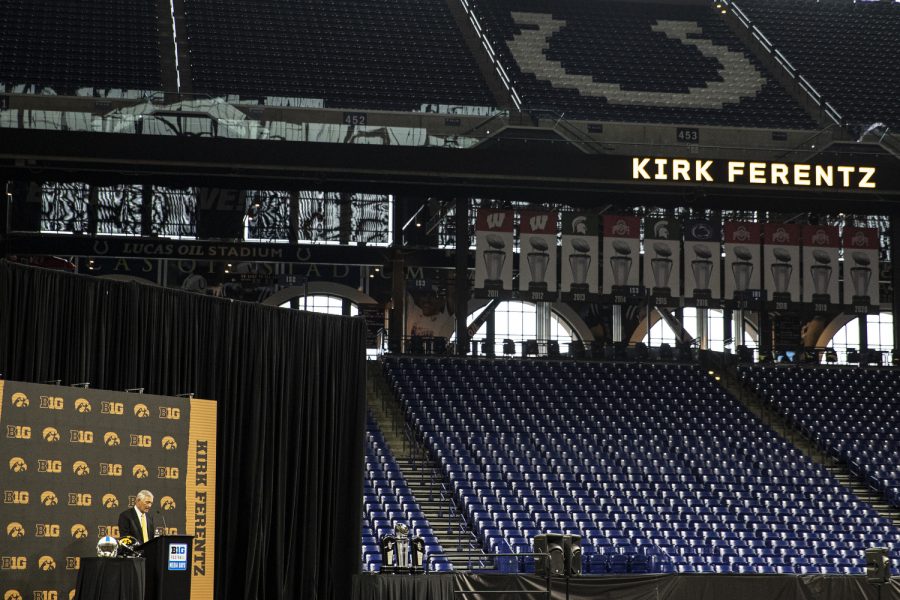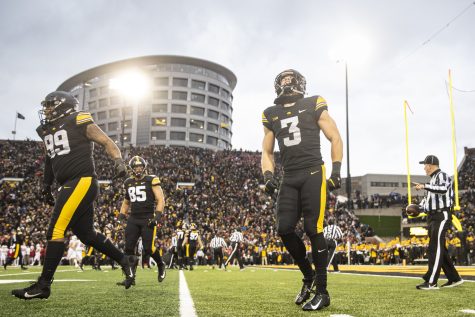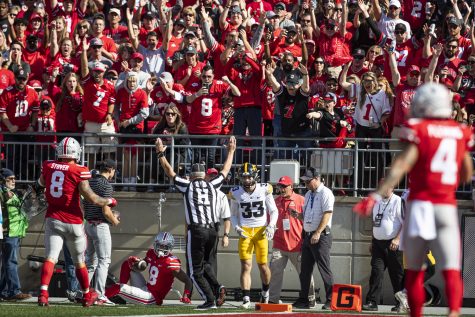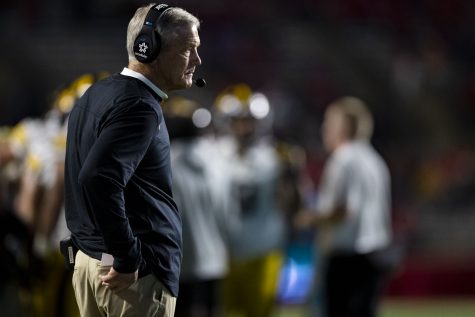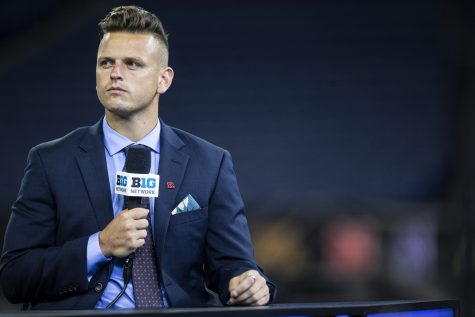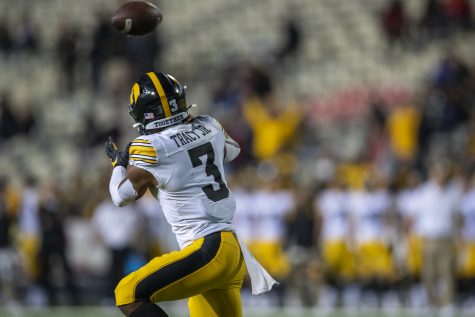Iowa football head coach Kirk Ferentz weighs in on name, image, and likeness, NCAA transfer rules
The Power Five’s longest-tenured active coach participated in the Big Ten Conference’s 50th annual football media days Tuesday afternoon at Lucas Oil Stadium.
Iowa head coach Kirk Ferentz speaks at the main podium during day one of Big Ten Media Days at Lucas Oil Stadium in Indianapolis, Ind., on Tuesday, July 26, 2022. The event marked the 50th annual Big Ten Media Days.
July 26, 2022
INDIANAPOLIS — As the longest-tenured head coach in the Power Five, Kirk Ferentz is often referred to as “the dean of college football.” And the now-24-year head coach of Iowa is concerned with the direction his sport is heading.
During multiple press conferences at Big Ten Football Media Days, the 66-year-old voiced his opinion on issues pertaining to name, image, and likeness legislation, College Football Playoff expansion, transfer rules, and conference realignment.
“I probably wouldn’t be the only person to say I’m really concerned about the path that college football is on right now,” Ferentz said Tuesday. “I’m eager to see where it heads and what direction we end up taking.”
Ferentz has been the head coach at Iowa since 1999. He also boasts over 30 years of collegiate coaching experience.
When Ferentz was named the Hawkeyes’ head coach in 1999, the Big Ten was made up of 11 teams. Since then, the conference has expanded to 14 teams. In 2024, that number will increase to 16 when the Big Ten adds UCLA and USC to its ranks.
“The clear message to me is that geography and tradition don’t mean near as much as some other things — TV probably being at the front of that list,” Ferentz said. “That’s just the way college has gone … The game has changed a lot. The environments have changed a lot. The things driving the direction of college football have changed.
“I just think about the travel,” Ferentz added. “Coming to Iowa is going to be a home game for (USC and UCLA). You know, as opposed to going all the way across the country. But that’s what comes with tradition, geography, et cetera. That’s just part of that process. I’m at the point right now where really nothing would surprise me.”
Ferentz suggested television contracts are one of the main sources of change in college football. He said TV “predicts the future” and “what TV wants is going to materialize.”
RELATED: Big Ten Commissioner Kevin Warren talks conference realignment, College Football Playoff expansion
Television deals have also been dictating current debates about expanding the College Football Playoff. Talks of increasing the size and scope of the postseason event have been tabled until ESPN’s contract to televise the tournament expires in 2025. The earliest the College Football Playoff can expand as things currently stand is 2026.
Ferentz said he is in favor of College Football Playoff expansion, noting that the national championship field either needs to be enlarged or shrunken back down to two teams.
Ferentz added that, when ESPN begins to air its CFP Rankings show during the season, it releases a weekly top 12. Ferentz said teams that appear outside the top 12 are “kinda like chopped liver.”
Ferentz also supported the College Football Playoff having regional sites, if it were to expand.
“I think we go back to two, which is not going to happen,” Ferentz said. “There’s absolutely no chance. So, you might as well expand it. At least get more people in the equation, more people in the discussion.”
Ferentz’s talk of nationwide college football policy didn’t end with postseason expansion. The two-time Big Ten Champion also shared his thoughts on an NCAA proposal that would allow student-athletes to transfer as many times as they’d like without penalty.
Ferentz lost wide receivers Charlie Jones and Tyrone Tracy to Big Ten West rival Purdue during the offseason. Tracy and Jones entered the NCAA Transfer Portal in December and May, respectively.
“There are a multitude of reasons that appear players can get a free transfer,” Ferentz said. “I think that’s pretty well-documented. I’m not sure that it’s going to impact anything in the game right now. Probably the biggest challenge, like I said earlier, I don’t think any of us want somebody on our team that isn’t happy being on the team. That just isn’t good for anybody.
“There’s always that temptation for people to consider tampering and things like that,” Ferentz added. “I’m not saying that happens, but I’m not saying it doesn’t happen either.”
The NCAA’s new transfer rules and name, image, and likeness legislation have affected Ferentz’s roster management strategy.
Ferentz suggested recruiting is changing in the Power Five, noting that incoming freshmen have name, image, and likeness deals on their minds before they even join a team.
“I don’t know how you gauge it, quite frankly,” Ferentz said. “I think there’s a lot of misinformation on NIL, a lot of exaggeration, hyperbole on that. I’ll throw this one at you. So, a player comes in and says, ‘I’ve got a deal for 100 at this school, what can you do?’ How do I know he’s got a deal for 100?
“Just think about that,” Ferentz added. “What does the contract actually say? That’s 100 how? Is it guaranteed? All those things that come with contracts or don’t come with. Who’s advising the players? There’s just a lot of gaps in there. There’s probably a better way to do this and still reward the players.”



